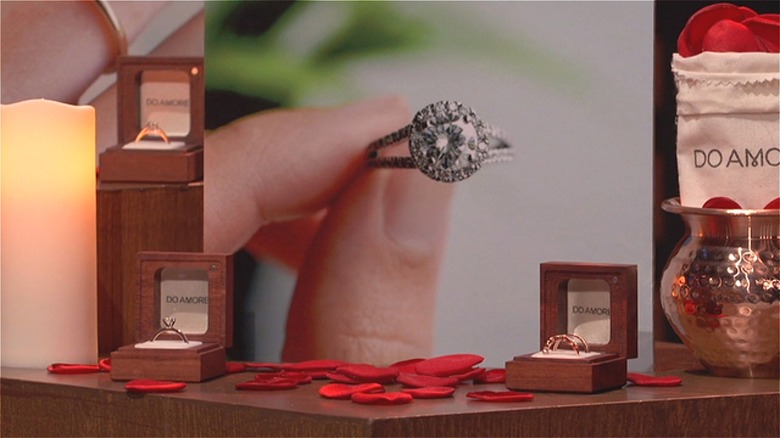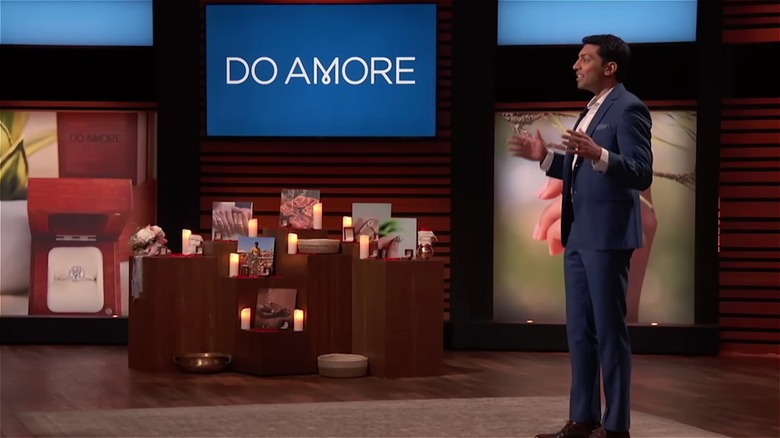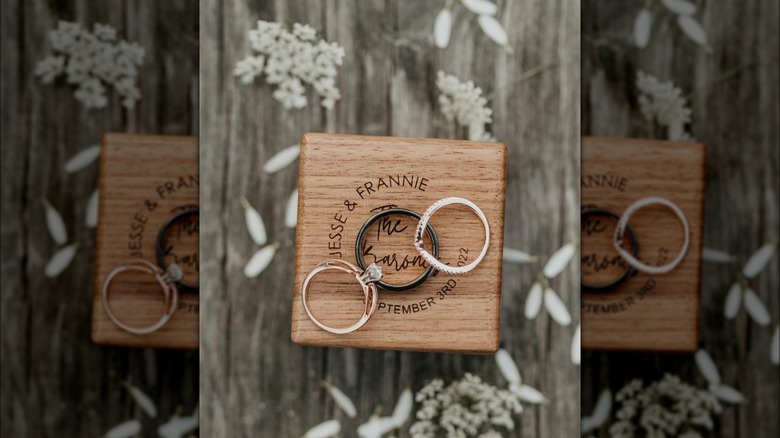What Happened To Do Amore Jewelry After Shark Tank?
As the philosopher Beyoncé once said, "If you like it then you should've put a ring on it." But considering that rings are such a high-stakes purchase, it's super easy to make mistakes when buying your engagement ring. With that in mind, one small business is stepping in to make sure that your special moment is perfectly crafted — and sustainable. Founded in 2014, Do Amore Jewelry is a humanitarian ring company. All of their jewelry settings are made from recycled metals, and their diamonds are ethically sourced from around the world.
Founder Krish Himmatramka aimed to launch a business that was socially impactful as well as profitable. So he founded Do Amore, where each ring purchased directly contributes to drinking water access in underdeveloped countries. This was inspired by his own experiences in India, where he was struck by the lack of clean water available. With this humane business model under his belt, Himmatramka entered season 13 of "Shark Tank."
In his pitch, Himmatramka explained how it works: couples can customize their own ring on the website and then track their purchase's impact around the globe. In the years since their launch, 20.5% of Do Amore's profits have gone towards this mission, he told the Sharks. With rings at a variety of price points, every purchase is a contribution — no matter how big or how small. The small business owner sought one investor's help growing Do Amore, but did the Sharks accept his proposal?
What happened to Do Amore Jewelry on Shark Tank?
In 2021, Krish Himmatramka arrived on "Shark Tank" in hopes of striking gold: $600,000 in exchange for 6% equity in his company. Do Amore was already doing pretty well: clearing $8.3 million in sales during 2020. While the Sharks were impressed by these numbers, they weren't extremely taken by his business idea.
Dallas Mavericks owner Mark Cuban noted that the barriers to entry for this type of company — a jewelry line that donates to a good cause — are low. Guest investor Daniel Lubetzky was the first to drop out, while Cuban and Barbara Corcoran quickly followed. Kevin "Mr. Wonderful" O'Leary made the first offer: in addition to the 6% equity, he wanted a royalty of $100 per purchase. This hefty deal was rejected by Himmatramka, who didn't see the value Mr. Wonderful could bring for that amount.
Then in a surprising move, Lubetzky returned to the offer table — 15% equity in exchange for the $600,000 investment, with no royalties. Additionally, he offered up 3% of his share to be donated to their water access mission. After a nerve-wracking back and forth, Himmatramka eventually accepted Lubetzky's golden offer.
Do Amore Jewelry after Shark Tank
While Do Amore was booming before "Shark Tank," appearing on the hit series only heightened the jewelry line's success. During the year of filming (2021), the company reached a whopping $11.5 million in revenue according to CNBC. In a blog post about their experience on the 'Tank, they shared that due to heightened interest, their site crashed shortly after the episode aired.
While it hasn't been confirmed whether Krish Himmatramka's deal with Daniel Lubetzky closed, his support for the company's mission is unwavering. On the night the episode aired, the angel investor tweeted: "I really believe in Krish and the mission @doamore is setting out to achieve. To celebrate, we are proudly donating $10,000 to Krish's cause @charitywater." Of his deal with the "Kind" snack bar founder, Himmatraka said (via CNBC): "Daniel understood what we're trying to do. Daniel's entire life's work has been social impact ... We're going to bring so many people clean water and sell so many rings."
As of 2023, Do Amore now offers a full range of jewelry, with necklaces and earrings also available on their website. Their Instagram also showcases stunning new diamond cuts and proposals to over 30,000 followers. As for their impact, the ethical jeweler is putting in the work. While some consumer brands aren't as sustainable as you think, Do Amore has provided nearly 16,000 people across 11 countries with drinkable water resources.


